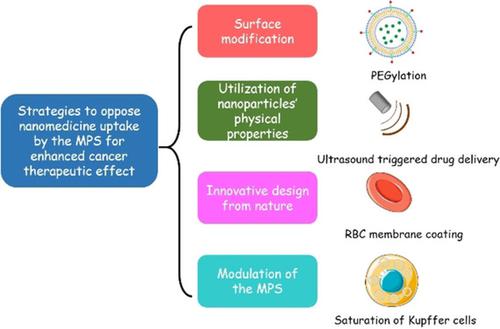当前位置:
X-MOL 学术
›
Chem. Asian J.
›
论文详情
Our official English website, www.x-mol.net, welcomes your feedback! (Note: you will need to create a separate account there.)
New Strategies in the Design of Nanomedicines to Oppose Uptake by the Mononuclear Phagocyte System and Enhance Cancer Therapeutic Efficacy
Chemistry - An Asian Journal ( IF 4.1 ) Pub Date : 2018-03-30 , DOI: 10.1002/asia.201800149 Yiming Zhou 1 , Zhifei Dai 1
Chemistry - An Asian Journal ( IF 4.1 ) Pub Date : 2018-03-30 , DOI: 10.1002/asia.201800149 Yiming Zhou 1 , Zhifei Dai 1
Affiliation

|
The application of nanotechnology in the treatment of tumors has boomed owing to the vigorous development in cancer nanomedicine. Despite the great success achieved in this field, nanomedicine has not realized its full potential owing to a delivery barrier, the mononuclear phagocytic system (MPS), which cuts off more than 95 % of the administrated nanoparticles. This results in an extremely low drug‐delivery efficacy to the tumor and leads to poor therapeutic outcomes. Moreover, the injection of excess nanoparticles also raises toxicity concerns induced by the accumulation of nanomaterials in organs, such as the liver and spleen. Therefore, a reduction in the uptake of nanomedicines by the MPS is vital to enhance the cancer therapeutic effect and decrease side effects. In this critical review, we will summarize the new strategies to reduce nanoparticle uptake by the MPS based on current knowledge of the bio–nano interaction. Further directions will also be highlighted for the development of cancer nanomedicine with a lower off‐target rate and better therapeutic outcomes.
中文翻译:

纳米药物设计中的新策略,以反对单核吞噬细胞系统的摄取并增强癌症的治疗功效
由于癌症纳米医学的蓬勃发展,纳米技术在肿瘤治疗中的应用迅速发展。尽管在该领域取得了巨大的成功,但是由于递送屏障单核吞噬系统(MPS)的存在,纳米药物尚未充分发挥其全部潜力,该系统可截断95%以上的纳米颗粒。这导致对肿瘤的极低的药物递送功效,并导致不良的治疗结果。而且,注射过量的纳米颗粒还引起由纳米材料在器官例如肝脏和脾脏中的积累引起的毒性问题。因此,MPS减少纳米药物的摄取对于增强癌症治疗效果和减少副作用至关重要。在这个重要的评论中,我们将根据目前对生物-纳米相互作用的了解,总结减少MPS吸收纳米颗粒的新策略。具有更低的脱靶率和更好的治疗结果的癌症纳米医学的发展也将被强调进一步的方向。
更新日期:2018-03-30
中文翻译:

纳米药物设计中的新策略,以反对单核吞噬细胞系统的摄取并增强癌症的治疗功效
由于癌症纳米医学的蓬勃发展,纳米技术在肿瘤治疗中的应用迅速发展。尽管在该领域取得了巨大的成功,但是由于递送屏障单核吞噬系统(MPS)的存在,纳米药物尚未充分发挥其全部潜力,该系统可截断95%以上的纳米颗粒。这导致对肿瘤的极低的药物递送功效,并导致不良的治疗结果。而且,注射过量的纳米颗粒还引起由纳米材料在器官例如肝脏和脾脏中的积累引起的毒性问题。因此,MPS减少纳米药物的摄取对于增强癌症治疗效果和减少副作用至关重要。在这个重要的评论中,我们将根据目前对生物-纳米相互作用的了解,总结减少MPS吸收纳米颗粒的新策略。具有更低的脱靶率和更好的治疗结果的癌症纳米医学的发展也将被强调进一步的方向。


























 京公网安备 11010802027423号
京公网安备 11010802027423号